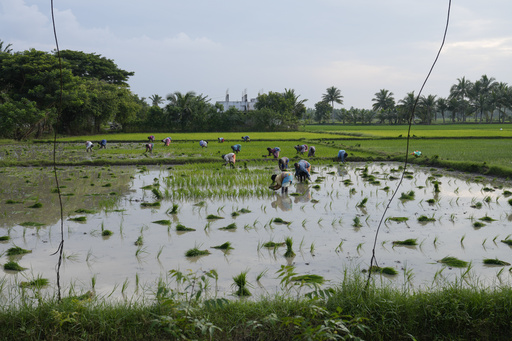
THULASENDRAPURAM, India — The village temple echoed with the sounds of Sanskrit and Tamil hymns as a Hindu priest held a flame in reverence to the deity. In this small South Indian locale, residents gathered to offer prayers for Kamala Harris, stirring curiosity among reporters vying for good vantage points.
Thulasendrapuram, a typical rural settlement in Tamil Nadu, stands out primarily due to its connection to a notable figure who could potentially be the first U.S. president with South Asian heritage. As millions of Americans head to the polls, Harris’s path has gained support from a village encircled by rice paddies and coconut trees, where her maternal family roots run deep. Locals discuss her candidacy at their tea shop, and her face is prominently displayed on banners throughout the area.
“Our deity is a powerful God. If we perform our prayers sincerely, he will grant her victory,” stated M. Natarajan, the temple priest, as he led the prayers before the idol of Ayyanar, a form of Lord Shiva.
Harris’s maternal grandfather, who hailed from this village, spent his childhood here before relocating to Chennai, about 350 kilometers (215 miles) away, where he held a prestigious government position until retirement. Although Harris has never visited Thulasendrapuram and has no remaining relatives in the area, the villagers still hold reverence for the family that has achieved great success in America.
The spotlight on the village has begun to generate economic benefits, including the recent initiation of a water storage tank project funded by a local bank. Residents report that the tank will include a plaque commemorating Harris.
Harris’s late mother, Shyamala Gopalan, originally from India, moved to the United States to continue her education, where she later married a Jamaican man. They named their daughter Kamala, which translates to “lotus flower” in Sanskrit. Though Harris has not frequently traveled to India since her childhood, particularly after her ascent to the vice presidency, she has frequently expressed her emotional connection to her mother’s homeland. Recently, she released a campaign video that showcases her mother’s journey, who immigrated to the U.S. at the age of 19 and made significant contributions as a cancer researcher.
The campaign video, titled “Mother,” concludes with a touching narration that states: “This daughter of Shyamala, this daughter of the American story, is ready to lead us forward.” Harris often mentions the guiding principles instilled in her by her Indian-born grandfather and mother while also expressing her enjoyment of South Indian cuisine, particularly idli, a type of steamed rice cake.
Harris is listed as a donor to the village temple, thanks to her aunt Sarala Gopalan’s contributions made in her name, alongside those of her grandfather. A large banner placed outside the temple conveys wishes for “the daughter of the land” as she seeks success in her political endeavors.
This past Tuesday, the temple also welcomed two American tourists and one visitor from the U.K., all donning black shirts emblazoned with the phrase “Kamala Freakin Harris.”
Manikandan Ganesan, a local shopkeeper near the temple, shared how Harris’s presidential campaign has brought newfound fame to the village. He expressed hopes that one day she would come to visit. “Hearing her mention of visiting our village would fill us with joy,” Ganesan stated. “Her victory itself will be a significant source of pride for our community.”
Villagers had previously prayed for her success in the 2020 election and celebrated with fireworks when she became Vice President. For the women of Thulasendrapuram, Harris’s journey provides inspirational motivation.
Local political leader Arulmozhi Sudhakar commented on how Harris’s candidacy represents a pivotal advancement for female empowerment in regions like Thulasendrapuram, where many women still grapple with discrimination and inequality. “From a time when women couldn’t even step out of their homes to now having someone from our village running for U.S. president — this fills us with happiness,” Sudhakar expressed. “Future generations will look to her as a role model to achieve success.”
